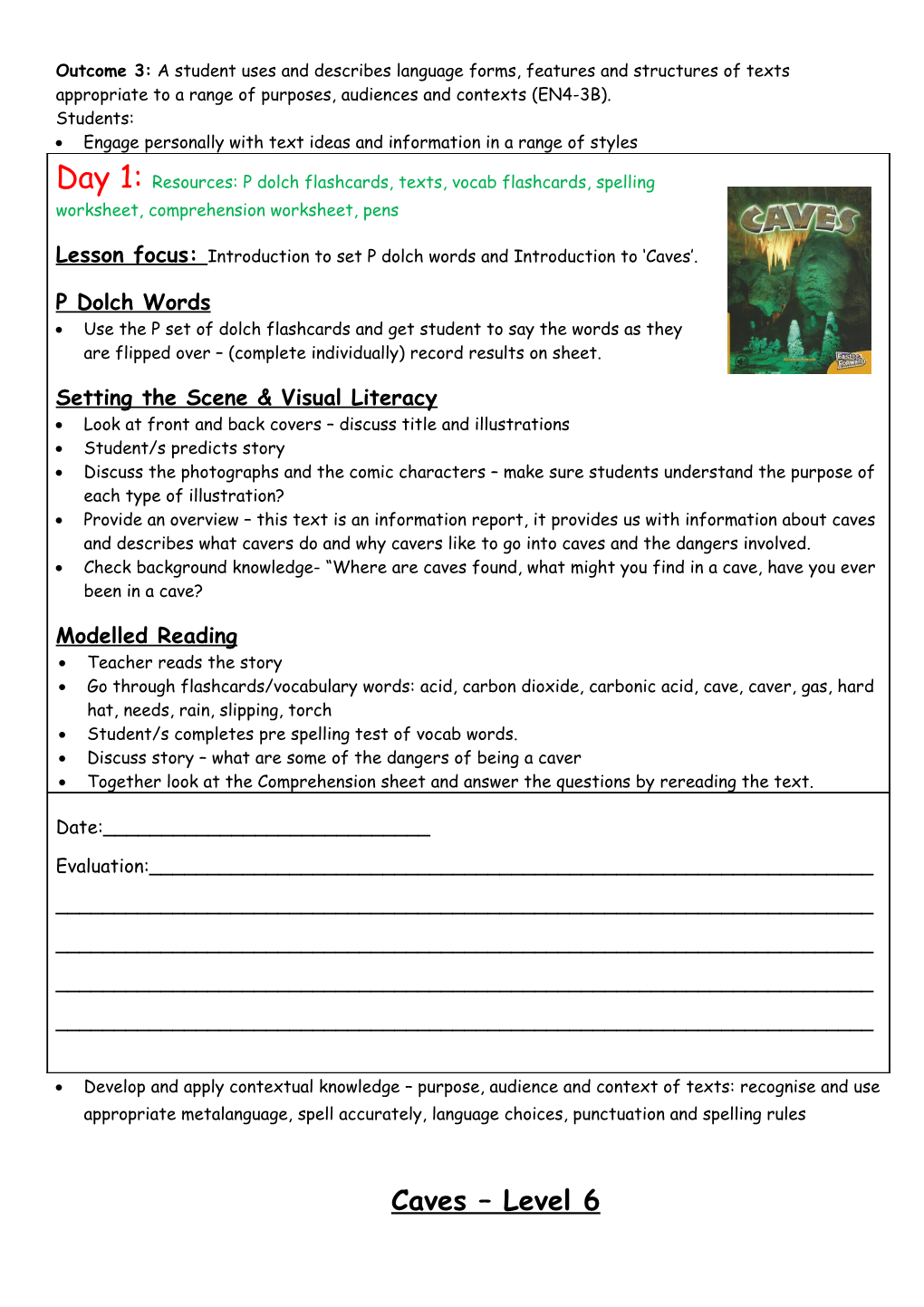Outcome 3: A student uses and describes language forms, features and structures of texts appropriate to a range of purposes, audiences and contexts (EN4-3B).
Students:
- Engage personally with text ideas and information in a range of styles
Day 1:Resources: Pdolch flashcards, texts, vocab flashcards, spelling worksheet, comprehension worksheet, pens
Lesson focus:Introduction to set Pdolch words and Introduction to ‘Caves’.
P Dolch Words
- Use the P set of dolch flashcards and get student to say the words as they are flipped over – (complete individually) record results on sheet.
- Look at front and back covers – discuss title and illustrations
- Student/s predicts story
- Discuss the photographs and the comic characters – make sure students understand the purpose of each type of illustration?
- Provide an overview – this text is an information report, it provides us with information about caves and describes what cavers do and why cavers like to go into caves and the dangers involved.
- Check background knowledge- “Where are caves found, what might you find in a cave, have you ever been in a cave?
- Teacher reads the story
- Go through flashcards/vocabulary words: acid, carbon dioxide, carbonic acid, cave, caver, gas, hard hat, needs, rain, slipping, torch
- Student/s completes pre spelling test of vocab words.
- Discuss story – what are some of the dangers of being a caver
- Together look at the Comprehension sheet and answer the questions by rereading the text.
Date:______
Evaluation:______
______
______
______
______
- Develop and apply contextual knowledge – purpose, audience and context of texts: recognise and use appropriate metalanguage, spell accurately, language choices, punctuation and spelling rules
Caves – Level 6
Day 2:Resources: P dolch flashcards, texts, vocab flashcards, vocabulary worksheet, pensLesson focus: student/s continues to develop automaticity of dolch words contextual understanding of the text and phonological awareness of words through worksheet exercises.
PDolch Words
- Go through P dolch Flashcards – record results on sheet (individually).
- Revisit last lesson – discuss the story: who, what, where, when and why.
- Student/s (or teacher/student) take it in turns to read a paragraph.
- Flashcards/vocab words.
- Student/s complete the vocabulary worksheet – discuss technical terminology of text.
- Student/s complete phonics worksheets – pay attention to phonological patterns: -ave (p4), -ow (p5), -ain (10).
Date:______
Evaluation:______
______
______
______
______
______
Day 3:Resources:Pdolch flashcards, texts, vocab flashcards, spelling worksheet, writing worksheet, small whiteboard, whiteboard markers, whiteboard eraser, pens
Lesson focus: student/s continues to develop automaticity of dolch words and grammatical understanding through writing worksheet.
P Dolch Words
- Go through P dolch Flashcards – record results on sheet (individually).
- Student/s (or teacher/student) take it in turns to read a paragraph
- Flashcards/vocab words
- Vocab spelling test
- Student/s complete the writing worksheet OR write as a group using small whiteboard and markers (students then transcribe onto worksheet) – make sure student/s understand the following components of an information report and should find facts in the text to support their writing.
- Final discussion of the text –
Why has it been written?
Who is telling the story?
What was the best part of the book & Why?
What was one thing you learnt about caves that you did not know before?
Date:______
Evaluation:______
______
______
______
______
______
